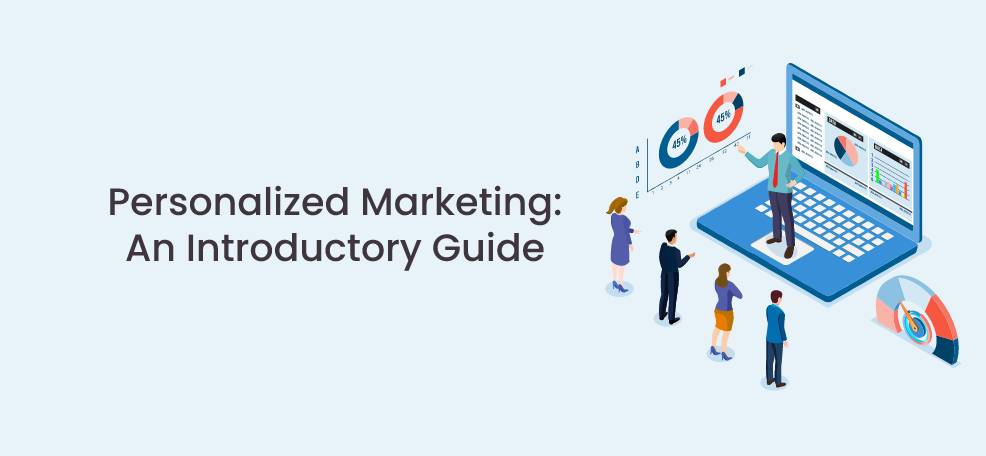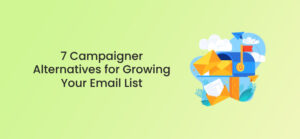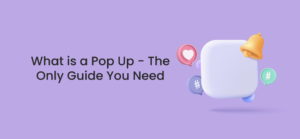Personalized marketing has come a long way from just popping your prospective’s name in the email header.
You’re in exactly the right place if you want to level up your marketing game to include personalized marketing campaigns. You’re also not alone. 41 percent of global marketers saw an increase in revenue growth after implementing AI technology in their personalized marketing campaigns.
This article serves as an introduction to personalized marketing. You’ll learn how to harness its power to deliver meaningful and fruitful marketing campaigns.
In addition, you’ll gain an inherent understanding of your customer demographic and your customers’ preferences and intentions. All of which will lead your business along the path of gaining more customers and, ultimately, more sales. Yay!
What is Personalized Marketing?
Personalized marketing, also known as one-to-one marketing, is the art of delivering tailored content to prospective customers. This is typically achieved using data-collection technology. If you make your customers feel that your marketing campaign solely exists for them, you’ve done it right.
To get it right, you need to know your customers. You can’t give them what they want if you don’t know them. AI technology provides valuable insights into your customers’ behaviors, intent, and desires.
This is what delivers personalized experiences. And when your customers enjoy their tailored experiences with your brand, they come back for more – becoming loyal and repeat advocates for your business.
Personalization Tools
Let’s explore how you’re going to go about collecting this valuable customer insight data. Some of your options include:
- Your CRM
Your CRM is the lifeblood of your business. It contains all the relevant information about your customers and leads. Lead capture forms and sales call data are all here. Combined with marketing tools, your CRM enables you to feed this customer data into your automated email system to personalize your marketing campaigns. - Analytics platform
Utilize platforms such as Google Analytics to gather data on digital interactions to understand who is browsing your site. Also, learn detailed information about navigation routes to attain where customers are dropping off in the funnel and how you can optimize their journeys.
- Data management platform
Holding information on campaign data, your data management platform enables you to manage this data and personalize campaigns by audience segmentation techniques. Segmentation can include demographics, location, technologies, and psychographic data.
Benefits of Personalized Marketing
As well as the obvious increase in revenue benefit for your business, the following benefits are relevant for both your business and your customers:
Reminders
Remarketing strategies enable you to build awareness and consideration of your brand. Astonishingly, audiences who view retargeting ads are 70 percent more likely to convert. So, gentle remarketing to your customers, reminding them of products they’ve previously viewed can certainly be a worthwhile marketing tactic.
Valuable Suggestions
When you understand your customers, you can serve up relevant suggestions that you know they’ll be interested in. Doing so makes them realize that your brand is first on the list for their next need. Anticipate their requirements and suggest options via personalized pop-ups, “recommended for you” lists, and cross-selling techniques.
Convenience
Personalization marketing techniques make it more convenient for customers to buy repeatedly from you. Simple actions like website autofill contact forms go a long way in encouraging brand loyalty from your audience and persuading them to buy from you as it’s an easy transaction.
Relevance
Your customers’ browsing history and previous behavior dictate their website journeys. A first-time visitor will be searching for information about your business. They will be trying to build a picture of your company and deciding whether your business is the right fit for their needs. Information that will be relevant to them at this stage in the purchase journey is:
- About pages
- Meet the team
- Company history
- Business mission statement
- Clear, concise products and descriptions
A good example of this is Nike’s About page, which details everything included on the list above. It starts with the message “If you have a body, you are an athlete,” which inspires the consumer to consider themselves as the perfect fit for Nike’s products, no matter their physical activity.
On the other hand, a customer who has frequented your website in the past will be further along the purchase funnel and is likely to want contact information. Base your website around different visitors and their requirements to meet their demands.
Ensure you place careful calls to action at each stage in the purchase journey and make it clear to your visitors how to find the information they need. A huge stumbling block in any marketing journey is dead-end pages or a customer being confused and leaving your site.
Personalized Marketing Goals
Before starting any new marketing strategy or campaign, it’s essential to set goals.
Ask yourself questions such as:
- Who is your target audience? Create customer personas to drill down your ideal consumers and think about whether you’re targeting existing or new customers
- Which marketing channels will you use? They could be tried-and-tested channels, or will you explore new ones for new audiences?
- What data will you need? Explore the relevant data to match your campaign goals
- What content will you need? Depending on your chosen marketing channels, your content will vary
- What do you want to achieve? Do you want to achieve increased average order value, more website visitors, increased overall revenue, more brand awareness?
- How will you measure success? Choose metrics to measure goal success
Examples of Personalized Marketing
Targeted Email Campaigns
Kicking us off is the tried and tested email marketing campaign. But this is with a difference. Using data to provide insights into your customers’ demographics, behavior, and buying patterns, you can deliver data-backed tailored email campaigns to encourage conversions.
Sending a relevant email at the right time delivers a considerably higher open rate and ROI than blanket, vague emails to every single person in your email system.
Ready for a real business example? Say no more. Birchbox is no stranger to personalization. Delivering tailored beauty products on monthly subscriptions. Their emails are also tailored so customers can choose exactly what they want:
Product Recommendations
Recommending relevant products to your customers reinforces relationships.
For example, telecommunications businesses sending personalized recommendations about workforce management solutions don’t need to answer the question “What is WFM?” in their marketing communications. Their segmented audiences already know the acronym refers to workforce management and that the solutions are relevant to them.
Social Media Remarketing
There’s a wealth of opportunity with social media remarketing techniques. Personalized suggestions are rife, with remarketing ads the norm now. Consider investigating Facebook Pixel to retarget prospectives on Facebook that are yet to become paying customers.
Video content is potentially the most engaging type of content on social media. If this media resonates with your audience, gather data from social networks about your customers and create personalized video campaigns to drive your brand’s message home.
Personalized Website Content
You can tailor your website content to different audience segments based on their demographics, sources of traffic, and areas of your website they’ve previously visited.
This means that when a visitor lands on your website, they can be navigated to the areas that are relevant to them. This optimizes their website journey and increases the chance of conversions.
For example, popular streaming service Netflix personalizes its viewing suggestions based on previously watched content.
As you can see in the screenshot below, the “Continue Watching” list is followed by more Korean drama content both in the “Korean TV Dramas” section and the “Trending Now” section.
This clever personalization comes as a result of a continuously improved algorithm that tracks viewing behaviors to target content, characters, and celebrities that could make the user want to watch more content on the streaming site.
Personalized Marketing FAQs
- How do I measure personalized marketing efforts?
As with any other marketing campaign, measure the success by using reporting and analytics software using set KPIs.
- How is personalized marketing different from traditional marketing?
Whereas traditional marketing is a wide net approach to engaging customers, personalized marketing focuses on understanding individual customers to deliver their best experiences.
- How does personalized marketing affect customers?
When done correctly, personalized marketing campaigns impact the customer significantly. Trust is a major factor in purchase decisions, so if you can deliver the element of trust in your marketing efforts, you’ll soon see rewards.
Personalization Meets Customer Expectations
Customers expect a lot when making purchase decisions. To meet their expectations, strive to always remember their name and their preferences. Recommend suitable products based on their preferences, and ensure all content and recommendations are relevant to them.
Depending on the relevance to your business model, some suggestions to do this include:
- Recommending the next thing to watch, read, or buy
- Requesting feedback at the opportune moment in the purchase cycle
- Offering product or service replenishment at the appropriate time
Steps to successful personalized marketing are gradual, and metrics should be measured along the way to determine results from individual campaigns. The below chart offers an example of where your business might be at right now and the stages moving forward.
Personalize This Way
For your business to stand out amongst the competition and the ever-increasing digital noise, personalized marketing campaigns could well be the answer.
When you embrace personalized marketing, you’ll reap the benefits of increased customer trust and brand loyalty and the potential for further revenue streams.
With 33 percent of US and UK marketers devoting more than half their marketing budget to personalization efforts, isn’t it time you joined them?
Author’s Bio:

Grace Lau – Director of Growth Content, Dialpad
Grace Lau is the Director of Growth Content at Dialpad, an AI-powered cloud communication platform with useful features such as free live video chat for better and easier team collaboration. Currently, she is responsible for leading branded and editorial content strategies, partnering with SEO and Ops teams to build and nurture content.









